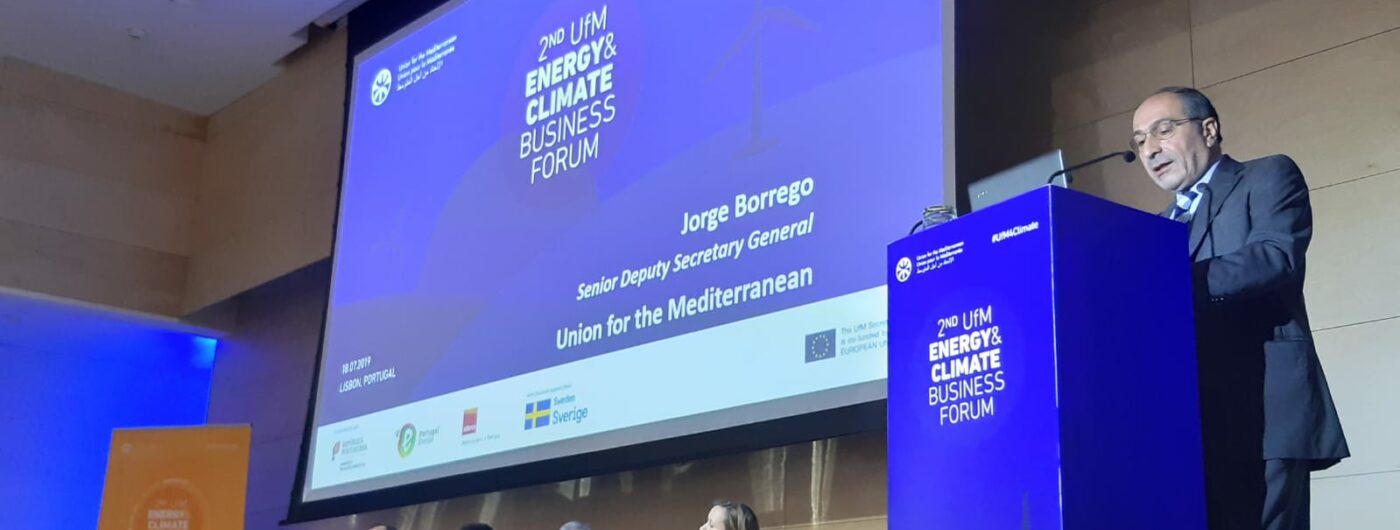
2nd UfM Energy and Climate Business Forum takes place to discuss regional energy demand and support local authorities towards energy transition
- The energy demand is estimated to increase by 62% in the Southern and Eastern Mediterranean countries by 2040.
- Showcased as a best practice in the region, the UfM-supported Tafila Wind Farm project powers 83 000 homes, represents almost 25% of Jordan’s energy produced from renewable sources and serves as a good example of involving local authorities to benefit from new renewable energy sources
Lisbon, 18 July 2019. The UfM is organising the second edition of the Energy and Climate Business Forum today in Lisbon, in partnership with the Portuguese Ministry of Environment and Energy Transition and the Portuguese Energy Agency (ADENE). Under the theme “Supporting local authorities in their efforts towards the energy transition”, the Forum further consolidates the active role taken by the UfM in endorsing and supporting regional dialogue initiatives and projects such as the Tafila Wind Farm (Jordan), in order to build a more sustainable and inclusive future for the region.
Some 150 representatives of local authorities, mayors, stakeholders, private sector investors, companies, service providers, international financial institutions and international and regional organisations working in the field of energy and climate action are discussing ways to enhance cooperation and promote innovative and tangible financing solutions oriented towards supporting local authorities’ efforts in developing renewable energies, improving energy efficiency, adaptation and mitigation climate actions in order to achieve a sustainable energy transition. Indeed, local authorities are best placed to drive the reduction of emissions through their unique position of being able to shape policy on land, buildings, water, waste and transport. City councils all over the region are taking initiative in attempts to boost renewable energy, tackle energy security, lower bills, generate employment and ultimately achieve inclusive and sustainable development.
During his opening speech, the Portuguese Secretary of State of Energy, João Galamba, has stated that: “Decarbonisation and Energy Transition should be addressed as driven action lines of our society as a whole. This represents a major strategic opportunity that implies the mobilization of all local communities. The UfM, in its unique role of regional dialogue and debate platform, shall be enhanced at all levels, including key actors and contributing actively to build an inclusive and proactive Mediterranean energy policy, that ensures the fulfilment of energy and climate goals and commitments. This conference provides an important and necessary forum to debate the key challenges that the energy transition is imposing for the next decades”.
Jorge Borrego, UfM Senior Deputy Secretary General for Energy and Climate Action, has added that: “While climate change remains a global issue, some of the best strategies for mitigation are implemented at the local level. When adequately addressed, the energy and climate challenges faced by the region can become business opportunities for local communities while also contributing to the transition towards sustainable energy. This is an opportunity that we must seize given that our Mediterranean region is so rich in renewable energy deriving from wind, solar and water sources.”
According to the Observatoire Méditerranéen de l’Énergie (OME), per capita energy demand is estimated to increase by 62% in Southern and Eastern Mediterranean countries by 2040 (taking 2018 as a reference). The Mediterranean region is also experiencing intensive industrialisation and tourism growth, which is also putting pressure on the energy resources available. The limit of a 1.5ºC increase in the average temperature (compared to pre‑industrial levels), not to be surpassed as agreed by the Paris Agreement, is already being exceeded in the Mediterranean region.
Tafila Wind Farm: A good practice
Wind energy is a very promising renewable energy source in the Mediterranean. The Tafila Wind Farm, which is the first utility scale renewable project in Jordan, has been recognised as a best practice during the event. This UfM-labelled project breaks new ground for renewable energy projects in the Mediterranean, and serves as an example of successful partnership between government and the private sector and has generated enormous growth in terms of business opportunities in the region. Beyond the fact that Tafila Wind Farm constituted almost 25% of the energy produced from renewable sources in Jordan in 2018 and currently powers 83 000 homes, it has become an important part of the local community. Indeed, 80% of the employees are from the local area, and Tafila Wind Farm provides scholarships for students, supports cultural activities, and runs a mobile clinic. It represents an inclusive and a viable alternative for a nation that had previously relied on fuel imports to provide electricity to the country’s homes and businesses.
The need for multi-level governance to successfully deliver a transition to a lower carbon society has been recognised across the region, as stated in the UfM action-oriented Roadmap for enhanced regional cooperation (Barcelona, 23 January 2017) and the UfM Ministerial Declaration on Energy (Rome, December 2016), and approved by the 43 Member-States. This Forum constitutes a milestone in the UfM’s energy related activities by seeking to mobilise private sector investment in the renewable energy sector, and to showcase innovative solutions in the region.
More information
With financial support from


